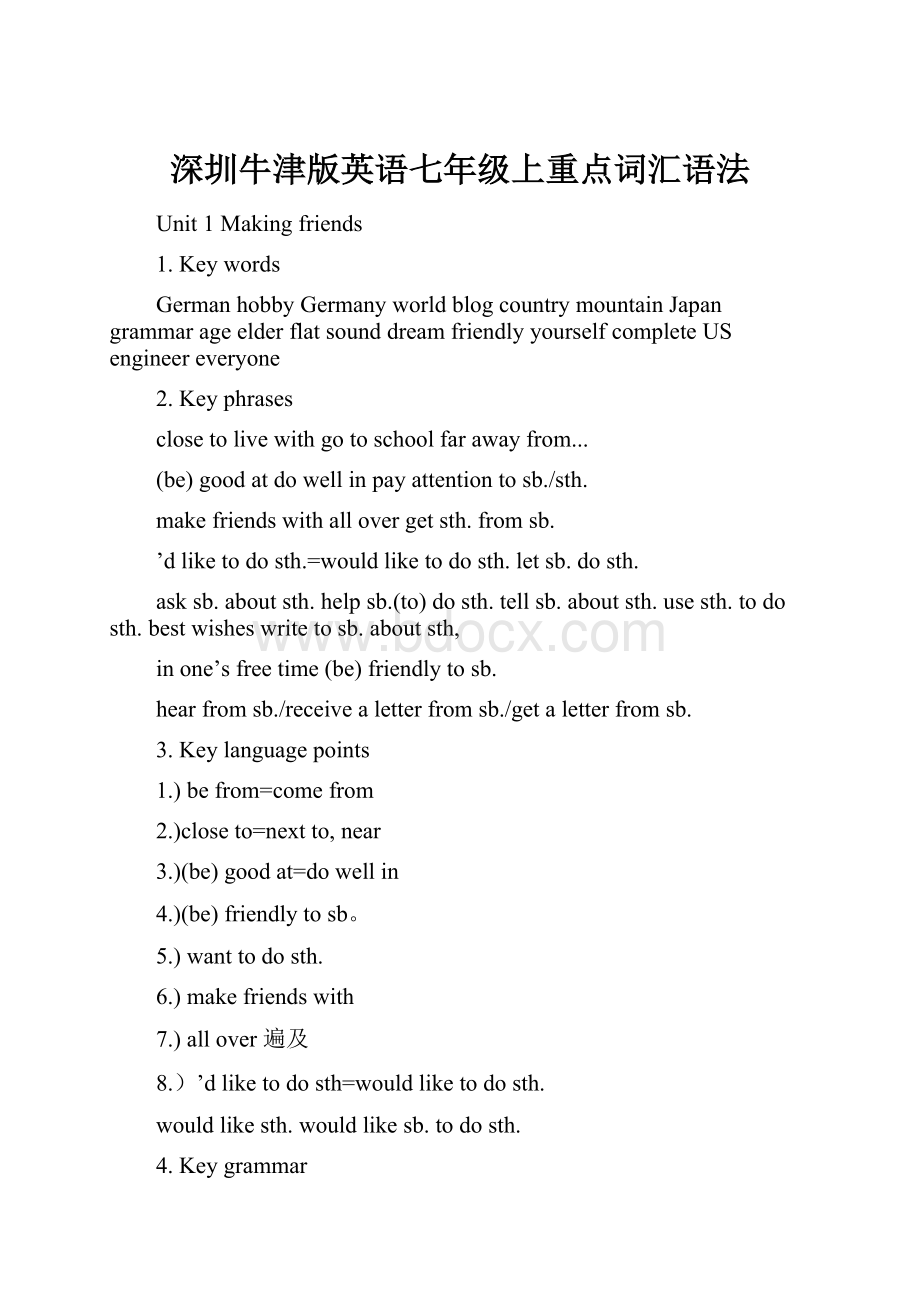深圳牛津版英语七年级上重点词汇语法.docx
《深圳牛津版英语七年级上重点词汇语法.docx》由会员分享,可在线阅读,更多相关《深圳牛津版英语七年级上重点词汇语法.docx(27页珍藏版)》请在冰豆网上搜索。

深圳牛津版英语七年级上重点词汇语法
Unit1Makingfriends
1.Keywords
GermanhobbyGermanyworldblogcountrymountainJapangrammarageelderflatsounddreamfriendlyyourselfcompleteUSengineereveryone
2.Keyphrases
closetolivewithgotoschoolfarawayfrom...
(be)goodatdowellinpayattentiontosb./sth.
makefriendswithallovergetsth.fromsb.
’dliketodosth.=wouldliketodosth.letsb.dosth.
asksb.aboutsth.helpsb.(to)dosth.tellsb.aboutsth.usesth.todosth.bestwisheswritetosb.aboutsth,
inone’sfreetime(be)friendlytosb.
hearfromsb./receivealetterfromsb./getaletterfromsb.
3.Keylanguagepoints
1.)befrom=comefrom
2.)closeto=nextto,near
3.)(be)goodat=dowellin
4.)(be)friendlytosb。
5.)wanttodosth.
6.)makefriendswith
7.)allover遍及
8.)’dliketodosth=wouldliketodosth.
wouldlikesth.wouldlikesb.todosth.
4.Keygrammar
A.特殊疑问句
1.疑问词
whatwherewhohowhowoldwhenwhywhichwhosewhattime(问时刻)howlonghowfarhowsoon多快howoftenhowmanyhowmuch
2.特殊疑问句构成:
特殊疑问词+一般疑问句
B.不定冠词a/an
Unit2Dailylife
1.Keywords
dailybellarticleringneverendtabletennisbandridepracticeusuallytogethersomarketseldomguitarGeographygradebreakstart
2.Keyphrases
juniorhighschoolonfoottakepartinhaveagoodtimegotobedgetuptalkaboutbetweenAandB(be)lateforschoolbrushone’steethrideabicyclemakenotesaddsth.tosth.attheendoftaketurnstodosth.arriveat/in
helpsb.withsth.Keepadiaryremembertodosth.enjoy/lovedoingsth.
3.Keylanguagepoints
1.)enjoy(doing)sth.
2.)lovedoingsth.
3.)ride(roderidden)
4.)endv./n.
5.)practicen.practisev.practisedoingsth.
6.)(be)latefor
7.)onfoot
8.)gotobed去睡觉gotosleep睡着了
4.Keygrammar
A.一般现在时
1.当谓语动词为实义动词时:
肯定句、否定句、疑问句、回答
2.当谓语动词为be动词时:
肯定句、否定句、疑问句、回答
B.频度副词和副词短语的使用
1、频度副词使用时一般放在动词前
alwaysusuallyoftensometimesseldomnever
2、频度副词短语使用时一般放在句末
everydayonceaweektwiceaweekallthetime
fivetimesayearattheweekendeveryday/night/year/month...
一、一般现在时:
【No.1】一般现在时的功能
1.表示事物或人物的特征、状态。
如:
Theskyisblue.天空是蓝色的。
2.表示经常性或习惯性的动作。
如:
Igetupatsixeveryday.我每天六点起床。
3.表示客观现实。
如:
Theearthgoesaroundthesun.地球绕着太阳转。
一般现在时的构成
1.be动词:
主语+be(am,is,are)+其它。
如:
Iamaboy.我是一个男孩。
2.行为动词:
主语+行为动词(+其它)。
如:
WestudyEnglish.我们学习英语。
当主语为第三人称单数(he,she,it)时,要在动词后加"-s"或"-es"。
如:
MarylikesChinese.玛丽喜欢汉语。
一般现在时的变化
1.be动词的变化。
否定句:
主语+be+not+其它。
如:
Heisnotaworker.他不是工人。
一般疑问句:
Be+主语+其它。
如:
-Areyouastudent?
-Yes.Iam./No,I'mnot.
特殊疑问句:
疑问词+一般疑问句。
如:
Whereismybike?
2.行为动词的变化。
否定句:
主语+don't(doesn't)+动词原形(+其它)。
如:
Idon'tlikebread.
当主语为第三人称单数时,要用doesn't构成否定句。
如:
Hedoesn'toftenplay.
一般疑问句:
Do(Does)+主语+动词原形+其它。
如:
-Doyouoftenplayfootball?
-Yes,Ido./No,Idon't.
当主语为第三人称单数时,要用does构成一般疑问句。
如:
-Doesshegotoworkbybike?
-Yes,shedoes./No,shedoesn't.
特殊疑问句:
疑问词+一般疑问句。
如:
Howdoesyourfathergotowork?
动词+s的变化规则
1.一般情况下,直接加-s,如:
cook-cooks,milk-milks
2.以s.x.sh.ch.o结尾,加-es,如:
guess-guesses,wash-washes,watch-watches,go-goes
3.以“辅音字母+y”结尾,变y为i,再加-es,如:
study-studies
一、写出下列动词的第三人称单数
drink________go_______stay________make________
look_________have_______pass_______ carry____
come________ watch______plant_______fly________
study_______brush________do_________ teach_______
二.按照要求改写句子
1.DanielwatchesTVeveryevening.(改为否定句)
___________________________________________________
2.Idomyhomeworkeveryday.(改为一般疑问句,作否定回答)
________________________________________________________
3.Shelikesmilk.(改为一般疑问句,作肯定回答)
___________________________
4.Amylikesplayingcomputergames.(改为一般疑问句,作否定回答)
___________________________________________________
5.Wegotoschooleverymorning.(改为否定句)
_______________________________________________________
6.HespeaksEnglishverywell.(改为否定句)
___________________________________________________
7.Iliketakingphotosinthepark.(对划线部分提问)
________________________________________________________
8.JohncomesfromCanada.(对划线部分提问)
___________________________________________________
9.Sheisalwaysagoodstudent.(改为一般疑问句,作否定回答)
________________________________________________________
10.SimonandDaniellikegoingskating.(改为否定句)
___________________________________________________
Unit3TheEarth
1.Keywords
Earthquizpatternprotectreportpartlandfieldlargeprovidepollutionpolluteburnenergy
groundkillintomustimportantfactkilometre
owncatchfewproblem
2.Keyphrases
provide...withput...into...throwawayareporton/about
keep...safeonEarthsitonthegrasslift...upthrow...into...keep...alivestopdoingsth.set...onfire
make...clean/dirtymakesb.dosth.asksb.forsth.asksb.(not)todosth.gowith与...一致atthebeginningof
forexampletakealookat看一眼...
3.Keylanguagepoints
1,)providesb.withsth.providesth.forsb.
2.)stopdoingsth.stoptodosth.
3.)Itis+adj.+forsb.+todosth.
4.)putsth.into...
5.)make+n.+adj.
6.)makesb.dosb.
7.)throwaway
8.)asksb.forsth.
asksb.(not)todosth.
4.Keygrammar
A.可数名词和不可数名词
1.可数名词复数的规则变化
2.名词复数的不规则变化
B.thereis/are...:
Therebe+某物/某人+某地
1.基本句型
2.就近原则
中考原题
1.—Oh,thereisn'tenough_____forusinthelift.
—Itdoesn'tmatter,let'swaitforthenext.
A.groundB.floorC.placeD.room
2.There_____anEnglishEveningnextTuesday.
A.wasB.willbe
C.willhaveD.aregoingtobe
3.There_____afootballgameinourschool.
A.hasB.willhaveC.willbe
4.Thereisgoingto_____areport_____Chinesehistoryinourschoolthisevening.
A.have;onB.be;on
C.have;forD.be;of
5.Thereis_____foodhere.We'llhavetobuysome.
A.anyB.someC.no
6.Thereare_____daysinaweek.
A.thesevenB.seventh
C.theseventhD.seven
7.Therearefew_____inthefridge.Let'sgoandbuysomepeas,carrotsandcabbages.
A.vegetablesB.fruit
C.meatD.eggs
8.Look!
Therearesome_____onthefloor.
A.childB.waterC.boxesD.girl
9.Thereweretwo_____peopleatyesterday'smeeting.
A.hundredsB.hundredsof
C.hundred
10.Theletterfrommyunclewasshort.Therewasn't_____news.
A.manyB.afew
C.muchD.few
名词变复数的练习题
一、单项选择
1.There____onthewall.Theyareverybeautiful.
A.arephotoesB.arephotosC.isaphotoD.isphotos
2.Thiskindofcar____madeinChina.
A.isB.areC.wereD.has
3.Therearefour____andtwo____inthegroup.
A.Japanese,GermenB.Japaneses,Germen
C.Japaneses,GermanD.Japanese,Germans
4.That’s___artbook.
A.anB.aC.theD.are
5.Theboyshavegot____already.
A.twobreadB.twobreadsC.twopiecesofbreadD.twopieceofbread
6.Theoldmanwants____.
A.sixboxesofapplesB.sixboxesofapple
C.sixboxofapplesD.sixboxsofapples
7.There___some____intheriver.
A.is,fishB.are,fishsC.is,fishsD.are,fish
8.There____two____inthebox.
A.is,watchB.are,watchesC.are,watchD.is,watches
9.Weshouldclean____twiceaday.
A.ourtoothB.ourtoothsC.toothsD.ourteeth
10.The____meetingroomisnearthereadingroom.
A.teacherB.teacher’sC.teachers’D.teachers
11.InBritain____areallpaintedred.
A.letterboxesB.lettersboxesC.letterboxD.lettersbox
二、写出下列名词的复数形式:
orange________class________text_______monkey_______
piano________child_________shelf________bed______
country_______family________toy_________foot_______
Japanese_______radio________photo_______army______
tomato________fox________woman_______knife______
sheep________
Unit4Seasons
1.Keywords
Australiabrightlyfootprintpicnicwetdrypuddle水坑snowykickspendtownrelativeblowduringeverythingshinetripseasongrandparent
2.Keyphrases
takeatripgetmarriedmakesnowmenstarttodo/doing
goswimminggotothebeachflykitesgoonapicnic
theSpringSestivalhaveapicniclikedoingsth./todosth.
like...bestduringthedayatthistimeofyearputsth.inorderspendtimewithsb.inthesnowgetredpackets收红包
duringthesummer/winterholidaysinthenorth/south/east/westof...
3.Keylanguagepoints
1.)Whatis...like?
=Howis...?
2.)spend(spentspent)
sb.spendtime/moneyonsth.sb.spendtime/money(in)doingsth.
4.)become/go/get/turn
指一个人暂时性的身心变化和永久性的自然变化,用become和get:
become/get+angry/old/ill
表示天气的变化时,可用become,get和turn
go通常强调由好变坏。
表示颜色时,可用go和turn.
5.)shinebrightlyblowstronglyrain/snowheavily/hard
6.)in/to/onthenorth/south/east/westof...(in内部on接壤to不接壤)
7.)go+doing:
goswimming
8.)flykites
9.)makesnowmen
4.Keygrammar
A.形容词作定语,放在名词前
B.形容词作表语,放在连系动词后
1.be
2.感官类:
looksoundsmelltasteseemfeel
3.变得类:
become,get,turn,go
C.形容词和动词不定式连用:
Itis+adj.+todosth.
D.形容词作宾语补足语,放在make,keep,find,think等动词的宾语后面。
E.常见的几个表示天气的形容词,通常是在相应名词后加-y构成。
Unit5VisitingtheMoon
1.Keywords
diarywithoutspaceweakspacesuitifbreathespaceshipnervouscameraleaveworkgravitygradenablerockfloatpostcardtiemachineourselvesreturn
2.Keyphrases
morethangoawayfrom(be)abletomakeasentencewith
havetobeexcitedaboutsth.sothatatthemoment
takephotosfrom..to...as...asinthefuturethatis也就是说
haveaholidaysuchastiesth./sb.tosth.把..系在...上
oneof...aladywithlonghairgetweakalargeamountof
ontheMoonwritesb.aletter/writealettertosb.
3.Keylanguagepoints
1.)sothat=inorderthat+句子/soasto=inorderto+v.
2.)havetodosth.
3.)Ittakesb.Sometimetodosth.
4.)If...(主将从现)
5.)as+形容词和副词原级+as
6.)oneof...
7.)(be)ableto=can
8.)morethan=over
4.Keygrammar
一般将来时(willdo/begoingtodosth.表示预先计划用begoingto)
2.一般将来时:
一、一般将来时的定义:
一般将来时表示在将来时间将要发生的动作或存在的状态,与